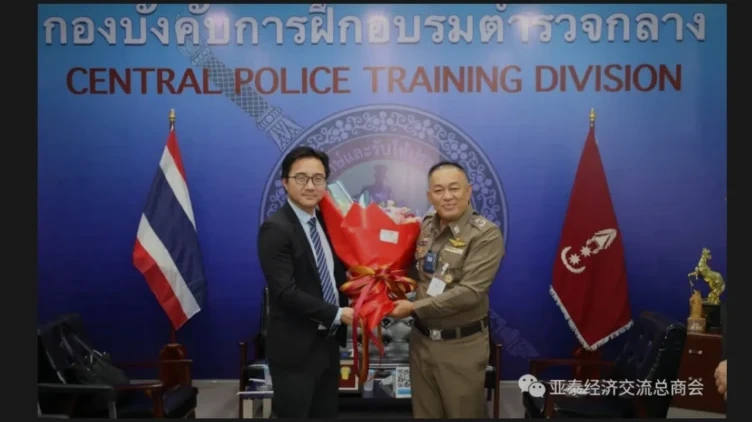Pig-Butchering Scams In Southeast Asia
Author:
• Reuters – By POPPY MCPHERSON and TOM WILSON
• SCARS Editorial Team
Pig Butchering Scams – How Deeply Wired Into Law Enforcement Chinese Criminals Are In Southeast Asia
How ‘pig-butchering’ scams have emerged as a billion-dollar crypto industry
At a Thai police headquarters in October 2022, Chinese businessman Wang Yicheng congratulated one of Bangkok’s most senior cybercrime investigators on his recent promotion, presenting the official with a large bouquet of flowers wrapped in red paper and a bow.
Mr. Wang, the vice-president of a local Chinese trade group, wished the new cybercrime investigator “smooth work and new achievements”, according to the group’s website, which displays photographs of the event.
Over the past two years, Mr. Wang has forged relationships with members of Thailand’s law enforcement and political elite, the trade group’s online posts show.
During that time, a cryptocurrency account registered in Mr. Wang’s name was receiving millions of dollars linked to a type of cryptocurrency investment scam known as “pig butchering”, a Reuters investigation has found.
In total, crypto worth more than US$90 million (S$120 million) flowed into the account between January 2021 and November 2022.
The victim of one of the scams was a 71-year-old California man.
According to blockchain analysis company Coinfirm, he sent money to crypto wallets that channeled more than US$100,000 into the account in Mr Wang’s name.
The man’s family told Reuters he lost about US$2.7 million, his life savings, after falling prey to someone claiming to be an attractive young woman called Emma.
The previously unreported transactions provide rare insight into the finances of pig-butchering scams, which involve engaging unsuspecting people online.
Scammers cultivate trust and then persuade victims to invest in fraudulent crypto schemes, sometimes via fake websites built to look like legitimate trading platforms. Sometimes the targets initially receive real returns to trick them into believing the scheme is legitimate.
Such scams have drawn intensifying scrutiny from global law enforcement over the past year, but little is publicly known about the people behind them.
Mr. Wang, who is 41 according to the account registration documents, did not respond to detailed questions for this article.
Neither did the Thai government, the Thai police or the Bangkok-based trade group Mr. Wang represented, the Thai-Asia Economic Exchange Trade Association.
Some aspects of the pig-butchering operation remain murky.
Ms. Lisa Wolk, a blockchain intelligence analyst at TRM, said the crypto account in Mr. Wang’s name “is a node in a money laundering network and not necessarily the ultimate recipient of funds”.
Ms. Erin West, a California prosecutor specializing in cybercrime, said she participated in a briefing in January about cyberfraud attended by agents from the US Federal Bureau of Investigation (FBI) and the US Secret Service.
A 72-page presentation prepared for the attendees, which Reuters reviewed, provides details on cyberscams operated from South-east Asia and cites Mr. Wang as among alleged beneficiaries.
The FBI and Secret Service declined to comment on the briefing, or on whether Mr. Wang was part of any investigation.
The crypto account registered to Mr. Wang was held at Binance, the world’s largest crypto exchange, according to three blockchain analysis firms.
In an August it was reported that the number of reports of pig-butchering scams it had received in 2023 was double that of 2022, an increase it attributed to an influx of inexperienced crypto investors and scammers looking to exploit them.
Crypto fraud has emerged as a multi-billion-dollar criminal specialty that has entrapped victims around the world.
According to the FBI, in the United States alone, victims reported losses of US$2.6 billion from pig butchering and other crypto fraud in 2022, more than double the previous year’s amount.
The true scale of the losses is unknown because victims are often too embarrassed to report crimes to the authorities.
In April, the US Department of Justice said it had seized about US$112 million worth of crypto linked to pig-butchering scams, without identifying suspects.
A warrant that resulted in the seizure of more than half that amount specified a Binance account registered in Thailand.
‘Absolute devastation’
Ms. West, the US prosecutor, said many victims in the hundreds of pig-butchering cases she has handled since early 2022 have lost more than US$1 million.
Many are never able to recover their money.
Ms. West said at least one victim died by suicide and another attempted suicide.
“I’ve never seen this level of absolute devastation,” she added.
Financial crime specialists say pig-butchering scams originated in China.
The US Treasury said in September that many such scams are now run by criminal organizations out of South-east Asia that use victims of labor trafficking to contact individuals around the world.
Cases are difficult to prosecute
Mr. Jeremy Douglas, regional representative of the United Nations Office on Drugs and Crime, told Reuters that perpetrators are typically “ruthless transnational organized crime syndicates” that thrive on corruption.
One of the blockchain analysis firms told Reuters that several scams connected to deposits made into the account in Mr. Wang’s name were run from an industrial park on the Myanmar-Thailand border.
According to two former workers and groups that support workers or scam victims, workers are trafficked to the area, known as KK Park, by gangs that force them to con people online.
China has announced a crackdown on cyberscams in recent months in partnership with Thailand and Myanmar.
Thailand has also said it is combating cyberfraud. Thai police in September announced the arrest of several Chinese nationals in connection with a crypto investment fraud operation.
Binance publicly said it had assisted Thai police with a probe into “a significant pig-butchering scam”, and that about US$277 million of assets were confiscated.
Thai police did not respond to questions about the operation or whether there was any connection to Mr. Wang.
Binance chief Changpeng Zhao stepped down and pleaded guilty to breaking US anti-money laundering laws on Nov 21, as part of a US$4.3 billion settlement resolving a years-long probe.
The US authorities said that over five years, Binance processed transactions by users who “laundered proceeds” of criminal activity, including scams.
Mr. Wang has continued to court officials
In August, he helped host an event in Bangkok, according to photos and a description published on the Thai-Asia association’s WeChat account.
Standing on a red carpet under a chandelier and flanked by floral decorations, Mr Wang “warmly welcomed” the guests.
They included a government minister, senior police officers and Chinese embassy officials, according to the trade group’s post.
Among those in attendance: Police Lieutenant-General Kornchai Klaiklueng, the assistant to the national police chief who previously headed up the cybercrime unit.
More Information:
- Binance & CEO Pleads Guilty Of Money Laundering 2023 (scamsnow.com)
- Crypto Seizure Breaking News – Major Cryptocurrency Seizure (scamsnow.com)
- Crypto Scams – Lloyds Bank Issues Urgent Warning Over Rising Threat – 2023 (scamsnow.com)
- 14K Triad Cybercrime Gang – Organized Criminal Enterprise Profile (romancescamsnow.com)
- Red Dragon – Organized Criminal Enterprise Profile (romancescamsnow.com)
- China Arrests 706 Chinese Scammers Involved In Phone & Internet Scams From Myanmar (scamsnow.com)
- Chinese Arrest 417 Phone Scammers In The Philippines (scamsnow.com)
- Scam Slavery Comes To Peru – 43 Malaysians Freed From Scam Center (scamsnow.com)
- China Cracks Down On Scammers – Chinese & Myanmar Police Arrests 1207 Scammers In Myanmar (scamsnow.com)
- China Cracks Down On Scammers – Chinese & Myanmar Police Arrests 269 Scammers In Myanmar (scamsnow.com)
- Scams and Cryptocurrency Go Hand in Hand (scamsnow.com)
- Criminal Cryptocurrency Boss Jailed For 11,196 Years In Turkey For Fraud (scamsnow.com)
- Human Trafficking & Scam Slavery – UN Issues New Report (scamsnow.com)
- Cryptocurrency Recovery Alert from the FBI (scamsnow.com)
- Coming In Contact With Forced Labor Scammer Slaves (scamsnow.com)
- 2,700 Scam Slaves Rescued In The Philippines [VIDEO] (scamsnow.com)
SCARS Resources:
- For New Victims of Relationship Scams newvictim.AgainstScams.org
- Subscribe to SCARS Newsletter newsletter.againstscams.org
- Sign up for SCARS professional support & recovery groups, visit support.AgainstScams.org
- Find competent trauma counselors or therapists, visit counseling.AgainstScams.org
- Become a SCARS Member and get free counseling benefits, visit membership.AgainstScams.org
- Report each and every crime, learn how to at reporting.AgainstScams.org
- Learn more about Scams & Scammers at RomanceScamsNOW.com and ScamsNOW.com
- Global Cyber Alliance ACT Cybersecurity Tool Website: Actionable Cybersecurity Tools (ACT) (globalcyberalliance.org)
- Self-Help Books for Scam Victims are at shop.AgainstScams.org
- Donate to SCARS and help us help others at donate.AgainstScams.org
- Worldwide Crisis Hotlines: International Suicide Hotlines – OpenCounseling : OpenCounseling
- Campaign To End Scam Victim Blaming – 2024 (scamsnow.com)
-/ 30 /-
What do you think about this?
Please share your thoughts in a comment below!
More ScamsNOW.com Articles
SCARS LINKS: AgainstScams.org RomanceScamsNOW.com ContraEstafas.org ScammerPhotos.com Anyscam.com ScamsNOW.com
reporting.AgainstScams.org support.AgainstScams.org membership.AgainstScams.org donate.AgainstScams.org shop.AgainstScams.org
youtube.AgainstScams.org linkedin.AgainstScams.org facebook.AgainstScams.org












Leave A Comment